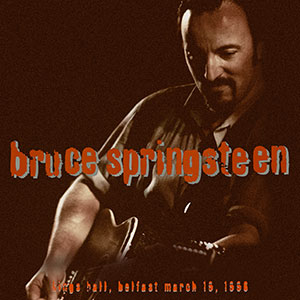Bruce Springsteen Going It Alone: The Ghost of Tom Joad Revisited

Belfast, Northern Ireland, 3/19/96
Bruce Springsteen. Solo Acoustic Tour.
By Erik Flannigan
Some fans dreamt about that phrase for the better part of two decades, even as they cherished the many band tours therein. Back in 1971-72, before there was an E Street Band, Springsteen dabbled as an acoustic singer-songwriter, gigging around Greenwich Village at tiny venues like Max’s Kansas City. So the solo performer had always been there, it just took some time to resurface.
The first sign came in 1986, when Bruce played Neil Young’s annual Bridge School benefit concert. While he was augmented for much of the show by Nils Lofgren and Danny Federici, the second song of the set was the powerful Nebraska-era arrangement of “Born In The U.S.A.,” and that singular performance showed the power Bruce could harness alone on stage.
Four years later in 1990, Springsteen gave two solo acoustic concerts in Los Angeles to benefit the Christic Institute (both of these truly astonishing sets were released in 2016 as part of the live download series). In hindsight, the Christic shows planted the seeds for the solo Joad tour five years later, blending fresh arrangements of familiar songs, material originally recorded solo and brand new music.
The March 19, 1996 Belfast show at King’s Hall was Bruce’s first ever in Northern Ireland and its recording captures the spirit and soul of the Joad tour brilliantly. We’re around 50 shows in at this point, with Springsteen performing at the most intimate venues he had played since Europe ‘81 and setting the tone that this was no arena concert.
“Just about all the music tonight is real quiet,” Bruce tells his Belfast audience as he did each night of the tour. “So I really need your help in getting that kind of silence.” And if someone fails to heed his simple request? “Politely, with a smile on your face, ask them to…shut the fuck up,” he suggests.
His hilarious admonishment reflects two of the most appealing elements of the Joad tour: first, the return of Springsteen as storyteller, a hallmark in the early years but less so in the ‘80s and ‘90s; second, a new level of candor from the artist that seemed squarely aimed at chipping away the myth and re-introducing us to Springsteen the man.
Some twenty years on, the Joad album and supporting tour performances play like a singular body of work, presented as much on Bruce’s own terms as any phase in his career, the exception being Joad’s kindred spirit, Nebraska. His artistic control is palpable as the Belfast show unfolds, eschewing beloved setlist staples in favor of nine beautifully rendered songs from Joad, many prefaced by self-deprecating stories or contextual background on his narrative subjects.
To the Joad material Bruce adds three at-the-time-unreleased songs played back to back: “The Wish,” a nostalgic ode to his mother’s love and support, introduced in humorous, unflinching language that might cause Adele to plug her ears; “The Little Things,” a chance encounter/hook-up tale, the intro to which challenges our notion of what is and what isn’t autobiographical in Bruce’s yarn-spinning; and “Brothers Under The Bridge,” a stunning addition to Springsteen’s canon of Vietnam Veterans songs, performed with understated, elegiac beauty all the way through its haunting final verse. “Brothers Under The Bridge” is a highlight of the show and stands with his finest songwriting on the subject or otherwise.
A riveting acoustic “Born In The U.S.A.” follows and continues the Vets narrative, and if that wasn’t sobering enough, “Reason to Believe” receives its most bleak reading ever, in a relentless, falsetto-dipped arrangement that pulls no punches, a far cry from the rave-up version heard on recent tours. Also rearranged to stunning effect are “Darkness On The Edge Of Town,” played with urgency and passion on 12-string acoustic, and “Bobby Jean,” recast as a mid-60s Bob Dylan number.
Like most shows on the tour, the main Belfast set closes with a four-song arc of Joad songs “set on the border between California and Mexico” exploring, as Bruce cites, what Mexican writer Carlos Fuentes described as something “more like a scar, than a border.” These tale and characters, observed and imagined during the years Springsteen lived in Los Angeles, form a kind of dark and dusty novella about what happens to those who dare to cross borders, both literal and figurative. The arc ends with “Across the Border,” a reflection on the inextinguishable hope that drives the dreams of those searching for a better life elsewhere.
Springsteen would open his musical aperture later in the tour at magical shows like the homecoming gigs in Freehold and Asbury Park. But Belfast, with its compelling contrast of stark music and challenging narratives offset by Bruce’s often funny, always candid storytelling, presents the Joad tour in pure form.